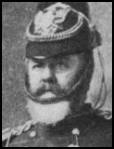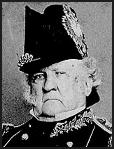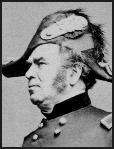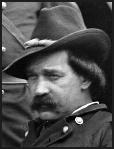A reader asked "Why the McPherson posts?" One may as well ask why celebrity journalism. Celebs are entertaining.
To the broad public, McPherson's work represents "our" highest aspiration as ACW readers and writers. He speaks on preservation issues, giving "our" consolidated opinion on saving battlefield land. To publishers, the success of Battle Cry represents "our" sales standard, the one we must meet to be successful as writers. When the Civil War leaks into current events, the press seeks McPherson for "our" aggregate opinion on this or that controversy.
McPherson has been made into "our" spokesman, representing the entire Civil War subculture - publishing, film, scholarship, re-enacting, television.
This is not just a political spokesman type of gig, however, it actually crosses into Hollywood's deepest colors of bathos.
Think of the juiciest Hollywood gossip story.
A diva who doesn't read music or sing well or act competently who was "made" by a hit single has not had a hit in a long while, but her entourage has never been bigger; the press cannot get enough of her; and she is on the cover of everything everywhere all the time giving all sorts of advice and comment. Sought for TV spots, her banal views are met with rapture. She is now branching out into Naval history - er, sorry, cosmetics and fashions.
The Hollywood gossip monger, understanding Greek dramatic form, awaits the correction to set in. The numbers from her next movie or record will tell part of the story; the insane levels of media saturation must cause a backlash some day. The hype surrounding each failed project must eventually scale back the outsized reputation. New actors will eventually stop fearing her and honestly comment on her achievments, what it's like to work with her, and what kind of person she seems to be.
The audience for this life drama expects the diva's downfall to be triggered by mistakes stemming from specific character flaws - flaws she was warned about, problems her hangers on kept her from confronting.
The gossip rags report these flaws - whatever they are - manifested however (tantrums, divorces, etc.) - and the subject denies them, creating a dissonance that begs resolution. That's entertainment.
The protagonist then heightens this dramatic tension by projecting her known but denied faults and errors into new shapes, larger forms, assuming ever greater risks, and meanwhile withholding signs of humility, shame, or fear.
And so we come to James McPherson.
I am reminded of an interview with Carl Sandburg or Robert Frost I read in the mid-sixties. The interviewer casually referred to his subject as a "poet," and the subject (Frost or Sandburg) stopped the interview immediately. The dialog went something like this:
Subject: Don't call me a poet, I am a writer.
Interviewer: Don't you write poetry?
Subject: "Poet" is a gift word bestowed by others - it is not for me to call myself a "poet" or to hear you or others call me that. Let "poet" be said outside my hearing.
And so "poet" was out of the record.
Now this may have been stagey buncombe but I think of that whenever Dr. McPherson presents his rear-end for lavish kissing by intervierwers who ask him what it's like to be the "greatest historian of his generation," or "the greatest Civil War scholar," or gush some other nonsense. He answers them without pause and without shame. So it seems.
His humility comes into question not only from a failure to correct the interviewer in such matters, but in his willingness to be used in the way a Hollywood celebrity is used. There are the celebrity endorsements (blurbs) that say essentially nothing but associate the McPherson "brand" with printed "product"; there are the tours, documented by the Washington Post, in which he takes groups of fans out to Gettysburg, then runs ahead of them - literally keeping his distance - barking comments over his shoulder. There are the assiduous public defenses made of fellow celebrities who get into ethical trouble with the law - think Goodwin. There is the rock-star hoopla associated with his public appearances.
Even the generous things he does, such as appear for free at roundtables to help raise money for them, have this component of egocentric self-indulgence, like a Hollywood benefit for (insert cause here).
Not that I'm not indulging myself here. But it's a private self-indulgence in front of fewer than 200 friends, like a drunk putting on a lampshade.
The press that interacts with McPherson are very like entertainment reporters. I have never read an interview with him in which the fawning questioner was anything more than the most casual ACW reader. In his routine attacks on academic history, I have never seen an interviewer challenge that; nor have I seen a writer who read McPherson and understood his historiographic context; nor gave I seen one who could do something as basic as discuss new trends in Civil War publishing with him.
McPherson wrote a a single-volume compendium of Civil War narrative recapitulated from popular secondary sources; that was his hit single. He has a virtual entourage of "hopefuls" - historians who know who and what he is but keep quiet imagining his good will can help them or his ill will may hurt. The ignorant interviewers keep coming. Local roundtables, benefitting from his appearances, promote his reputation to the skies. He deigns to speak by conference call nowadays.
McPherson imposed upon Gary Gallgher recently to give him license to write the history of the Civil War navies for the University of North Carolina Press because he thought he would like to do that. There was no major trade house asking for a project - he hunted this up. He's going to do it the way he does everything, by aggregating secondary sources. Watch.
McPherson's newest book, published this spring, was brought out by Kluwer, a Netherlands medical publisher, which has been building trade business stateside by buying specialist imprints like Da Capo. Kluwer issued his book through an obscure U.S. imprint.
This is not a hitmeister cranking it out. This is fadeout per "A Star is Born."
Speaking of which plotline, the only two McPherson students actively writing that we have been able to identify, Carhart and Clinton, each have books out this year issued by a major trade house. Clinton's was well received but is doing poorly; Carhart's has been poorly received but is selling decently. No stars here.
Meanwhile, "the greatest living Civil War historian of his generation" is reading royalty statements written in Dutch.
You wonder how this docudrama is going to end ... which is why the coverage will continue.
 Marx envisioned a period after socialism when all needs would be met and the state would wither away. He called it post-scarcity anarchism.
Marx envisioned a period after socialism when all needs would be met and the state would wither away. He called it post-scarcity anarchism.
 We're on our way to methodological excellence!
We're on our way to methodological excellence!








